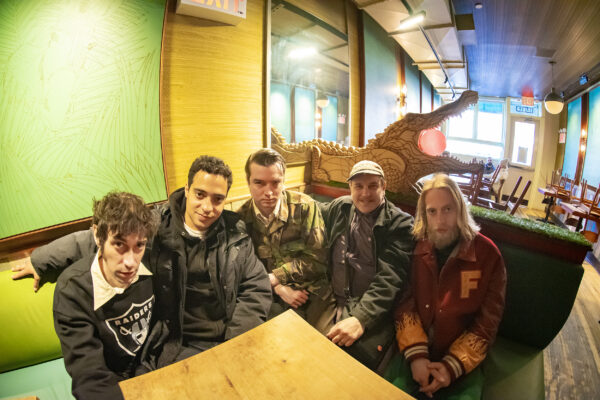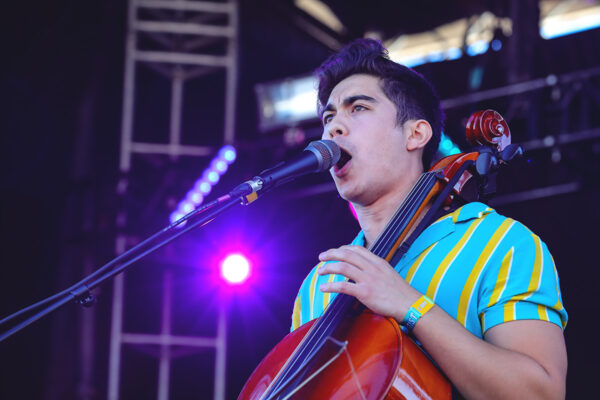Sitting on a rickety wooden bench Williamsburg, pop artist Darwin Deez is waxing poetic about the trouble with lyrics. “There’s only so many words you can rhyme with love. There’s what, like 3 or 4 words? Above, shove, glove…I like it when a lyrical rhyme surprises me. I try to stay away from love.”
With his latest album, “Double Down,” released this past week, Deez is finding himself hoping that the success he has found on the UK scene will translate Stateside. Although he appreciates the simple pleasure of being able to walk down the street without mobs of fans invading his personal space, there is something to be said for achieving a modicum of success that can lead to financial freedom, according to the artist. Deez has made music his full time pursuit, churning out his pop tunes from his apartment in Williamsburg and always searching for the perfect lyrical combination that will hit home with his audiences. Pancakes and Whiskey sat down with the artist to find out what moves Deez to spread his creative wings.
P&W: Like the old adage of the chicken and the egg, which comes first, the music or the lyrics?
DD: It’s usually music first but in the case of my second album, on that record I was really interested in experimenting with different lyric approaches. Because when you start with music first, you’re always looking for words that fit into a certain groove. When I did songs that started with the lyrics, it was just an open page and there was no set number of syllables that I’m trying to funnel things into, like Plinko.
P&W: Do you juxtapose the rhythm and cadence of the music to enhance the lyrics, or do you want to create a mood with the music and hope they hear the words?
DD: I’m hoping to set a mood and tell a story using words and the emotional aspect of that setting is determined by that music. I’m pretty conscious of the first line of the song to establish the context immediately because once you can set the scene and create that in the listener’s mind, it gives you a lateral freedom to be very specific with words. Like if I said, “pen,” it’s less evocative than if I said, “a chewed up Bic.” The more specific you can get with a little bit of contact first then you can get your message across. Like the first line in “Chelsea Hotel,” it’s a very specific construction scene with the insulation in the dumpster. The main thing is to get across the conceptual idea you’re going for.
P&W: So you want people to be enveloped in the story of the song and not just sing along with the lyrics?
DD: Yeah, because the chorus is usually the hook and the part that encapsulates what the emotion is, but in order for people to get on board with that, they have to hear the emotion in the verse and you can capture them that way.
P&W: You have a song, “Bad Day” where the lyrics are a bit mean-spirited but the music is up beat and very pop-like. Who did you write that for and why did you choose such a pleasant tune to accompany such a harsh message?
DD: There were a couple of inspirations for this song. My mom was complaining about this guy from her neighborhood who would put bags of dog poop in her trashcan while he was on his walks and my mom, who lives in Chapel Hill, NC, had a confrontation with him. The song was just about those little things that can ruin your day. I also had a coworker who I didn’t get along with and when we would send someone down to the store to get everybody something during the shift, he would always skip me. It’s such a small thing, but it can really turn you against someone. The song is kind of my style, to do that, like the German thing—enjoying someone else’s suffering—and I liked the mood of that song even though I don’t want people to suffer terribly. You know people have felt like that and it’s about getting people to relate because we have all felt like that.
P&W: Do you think “pop” is a dirty word? Would you classify yourself in that genre?
DD: A pop song has to be about emotion at its core; it can’t be just about an idea. I tried to write pop songs about ideas before, like existentialism, but I don’t think people connected with it. I don’t think they felt anything when they heard it. I’m trying to work within the framework that people like Miley Cyrus or Katy Perry have created. Trying to work within that three and a half minute pop template. You can’t write a song just about an idea unless your someone like Joni Mitchell, which I’m not. I’m an indie artist who writes pop songs.
P&W: Which lyric have you penned that best defines what Darwin Deez is all about?
DD: I would have to say from the song, “Good to Lose,” the lyric is, “With a career track to the fridge and back, I can my slide my feet on a dryer sheet.”
P&W: And what does that lyric mean to you?
DD: It’s just an expression of mood that has thematic elements and a setting that you can picture. It sums up that whole song that it’s cool to do nothing and be a loser. There’s a feeling of crappiness that goes along with this feeling of nothingness. But like there’s a gloriousness inside of this feeling of I’m doing nothing with my life; a celebration of being happy about nothingness. There’s a glory inside of the shame.
Article: Hannah Soule





